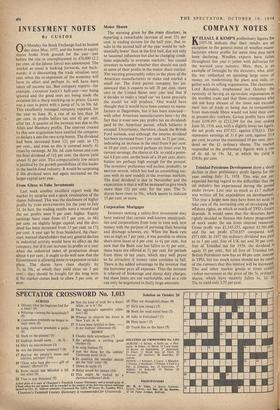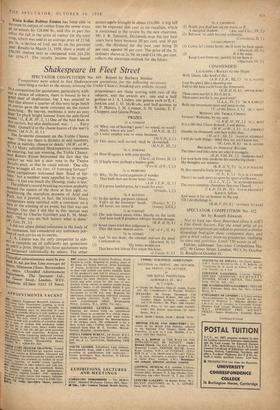COMPANY NOTES
KELSALL & KEMP'S preliminary figures for 1957-58 indicate that their results are an exception to the general trend of woollen manu- facturers whose profits for some time past have been declining. Woollen exports have fallen throughout this year ttlether with deliveries for the worsted yarn industry. Here, then, is an example of foresight by the directors, who, after the war embarked on spending large sums of money on modernising the plant and mills to- gether with its selling organisation. The chairman, Lord Rochdale, emphasised last October the necessity of having an up-to-date organisation in the woollen trade and that those companies who did not keep abreast of the times and excused their loss of trade as being due to competition from man-made fibres would not hold their own in present-day markets. Group profits have risen from £198,995 to £212,399 for the year ending June 30, 1958, and, with a slightly lower tax figure, the net profit was £97,921, against £78,613. This represents earnings of 31.6 per cent, against 23.4 per cent. to cover the maintained 10 per cent. divi- dend on the £1 ordinary shares. The market responded to the preliminary figures with a rise of 4s. 6d. to 19s. 3d., at which the yield is £10 8s, per cent.
Trinidad Petroleum Development show a sharp decline in their preliminary profit figures for the year ending July 31, 1958. This was not un- expected having regard to the difficulties that the oil industry has experienced during the period under review. Last year as much as £1.7 million was written off for expenditure on development. This year a larger sum may have been set aside to take care of the increasing cost of developing the offshore rights, on which so much of TPD's future depends. It would seem that the directors have rightly decided to finance this future programme of work under the sea from internal resources. Gross profit was £1,145,355, against £1,581,600, and the net profit £710,855 compared with £971,600. In 1957 the ordinary dividend was paid as to 5 per cent, free of UK tax and 30 per cent. free of Trinidad tax for 1958; the dividend Is again 35 per cent., but all free of Trinidad tax. British Petroleum now has an 80 per cent. interest in TPD, but too much notice should not be taken of the rumours that this interest will be increased. This and other market gossip at times causes violent movement in the price a the 5s. ordinary shares, which have recently fallen 6s. 3d. to 75s. to yield only 3.75 per cent. Kittle Kellas Rubber Estates has been able to increase its output of rubber from the newer areas of its estates by 128,000 lb., and this in part has offset the fall in the price of rubber for the total crop, p which was sold at an average price of 21.9d. per lb., a decline of 3.6d. per lb. on the previous year. Results to March 31, 1958, show a profit of #50,105 (before tax) as compared with £61,246 for 1956-57. The royalty income from leased
estates again brought in about £16,000. A big fall can be expected this year in tin royalties, which is mentioned in the review by the new chairman, Mr. J. R. Tannock., Dividends over the last four years have been between 20 per cent. and 30 per cent., the dividend for the past year being 20 per cent. against 30 per cent. The price of the 2s. ordinary shares at 2s. 9d. to yield €14 10s. per cent. reflects the uncertain outlook for the future.



































 Previous page
Previous page